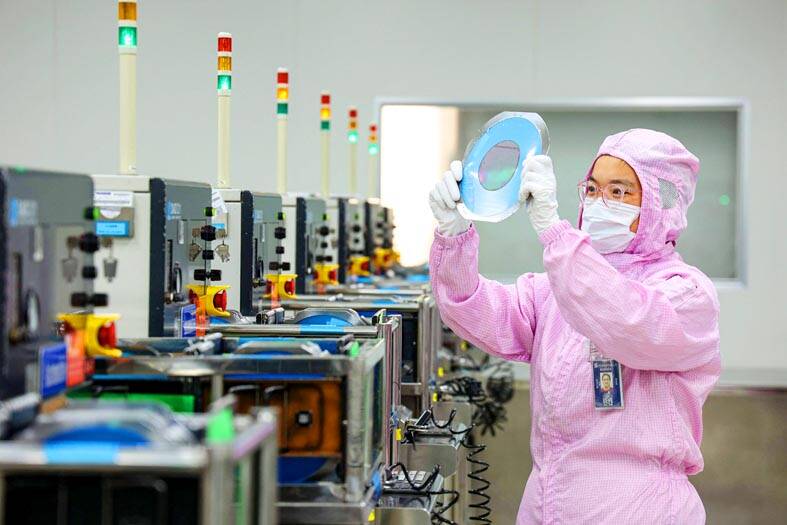Investigators yesterday said they have raided 16 Chinese-funded companies suspected of illegally poaching high-tech talent to steal secrets from the nation’s chip industry.
Taiwan is a global powerhouse in semiconductor manufacturing, with more than half of the world’s chips and nearly all of the high-end ones made here.
China is racing to develop the advanced chips used to power artificial intelligence (AI) systems, as it faces export restrictions imposed by the US.

Photo: AFP
Hundreds of officials searched 70 locations across the country and questioned 120 people from July 15 to Wednesday, the Ministry of Justice Investigation Bureau said.
The probe is still underway and no charges have been filed, a bureau investigator surnamed Gu said, adding that there were “around 25 to 30” such investigations every year.
Intelligence shared by the bureau indicated “several illegal mainland-funded enterprises have been stealing Taiwan’s high-tech secrets through illegal poaching,” said the Hsinchu District Prosecutors’ Office, which was involved in the raids.
The companies targeted had “used diverse and highly harmful infiltration methods,” it said.
Among the firms searched were Goertek Inc (歌爾聲學), a major Apple Inc supplier, and US-listed VNET Group.
Taiwan has long accused China of carrying out espionage activities in the nation, as Beijing is pushing hard to develop its own chip capabilities.
Taiwan put Chinese tech giant Huawei Technologies Co (華為) and chip titan Semiconductor Manufacturing International Corp (SMIC, 中芯) on an export blacklist this year, further squeezing Beijing’s access to the technology needed to build the most advanced chips.
Local companies wanting to ship high-tech products to Huawei, SMIC or any other entity on the list would have to obtain permission from the government.
The Investigation Bureau in March said that SMIC and other Chinese companies were being probed on suspicion of illegal talent poaching.

Taiwan’s long-term economic competitiveness will hinge not only on national champions like Taiwan Semiconductor Manufacturing Co. (TSMC, 台積電) but also on the widespread adoption of artificial intelligence (AI) and other emerging technologies, a US-based scholar has said. At a lecture in Taipei on Tuesday, Jeffrey Ding, assistant professor of political science at the George Washington University and author of "Technology and the Rise of Great Powers," argued that historical experience shows that general-purpose technologies (GPTs) — such as electricity, computers and now AI — shape long-term economic advantages through their diffusion across the broader economy. "What really matters is not who pioneers

In a high-security Shenzhen laboratory, Chinese scientists have built what Washington has spent years trying to prevent: a prototype of a machine capable of producing the cutting-edge semiconductor chips that power artificial intelligence (AI), smartphones and weapons central to Western military dominance, Reuters has learned. Completed early this year and undergoing testing, the prototype fills nearly an entire factory floor. It was built by a team of former engineers from Dutch semiconductor giant ASML who reverse-engineered the company’s extreme ultraviolet lithography (EUV) machines, according to two people with knowledge of the project. EUV machines sit at the heart of a technological Cold

Taiwan Semiconductor Manufacturing Co (TSMC, 台積電) last week recorded an increase in the number of shareholders to the highest in almost eight months, despite its share price falling 3.38 percent from the previous week, Taiwan Stock Exchange data released on Saturday showed. As of Friday, TSMC had 1.88 million shareholders, the most since the week of April 25 and an increase of 31,870 from the previous week, the data showed. The number of shareholders jumped despite a drop of NT$50 (US$1.59), or 3.38 percent, in TSMC’s share price from a week earlier to NT$1,430, as investors took profits from their earlier gains

TAIWAN VALUE CHAIN: Foxtron is to fully own Luxgen following the transaction and it plans to launch a new electric model, the Foxtron Bria, in Taiwan next year Yulon Motor Co (裕隆汽車) yesterday said that its board of directors approved the disposal of its electric vehicle (EV) unit, Luxgen Motor Co (納智捷汽車), to Foxtron Vehicle Technologies Co (鴻華先進) for NT$787.6 million (US$24.98 million). Foxtron, a half-half joint venture between Yulon affiliate Hua-Chuang Automobile Information Technical Center Co (華創車電) and Hon Hai Precision Industry Co (鴻海精密), expects to wrap up the deal in the first quarter of next year. Foxtron would fully own Luxgen following the transaction, including five car distributing companies, outlets and all employees. The deal is subject to the approval of the Fair Trade Commission, Foxtron said. “Foxtron will be